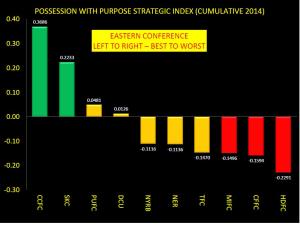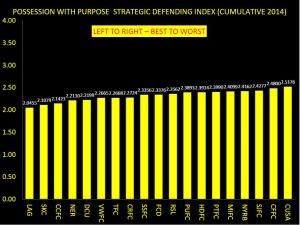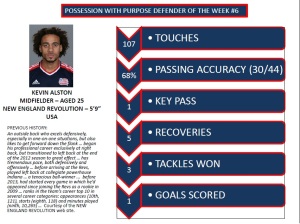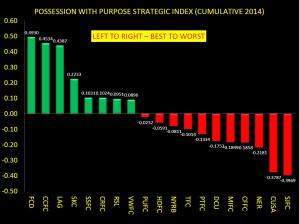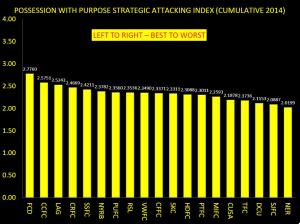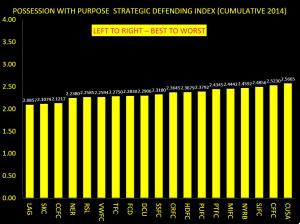MLS PWP through 6 Weeks: Does the wheat begin to separate from the chaff?
/You might not think that six weeks is enough to begin to categorize what teams are performing well and what teams aren't - I may even agree with you to an extent, but here's the thing: we're six weeks in, and patterns are beginning to take shape. Instead of just showing the combined Index for all 19 teams I'm going to split them up into the Eastern and Western Conferences to show a different view. And here's my link to the Introduction to PWP.
Here's all the Eastern Conference teams up after 6 weeks (note some teams have yet to play six games):
Observations:
The intent here is to offer up a graphic that shows which teams are performing better in attack than their opponents so far. No intent here to write off anyone, yet... too early for that with 28 games and a maximum of 84 points still being available.
Let's just say that Berhalter and Vermes have their teams in top gear - while Hackworth, Olsen, Petke, Heaps and Nelson are still fine tuning... as for Klopas, Yallop and Kinnear performance needs to get better and I'm sure they already know that.
As a reminder - this Index is the difference between how well a team executes the six primary steps of Possession with Purpose versus how well their opponents execute those same steps against them. A negative number thus means that, on average, the opponent is performing those six steps better (collectively) than that team.
I'm not a betting man yet on this Index, but if you think the odds are good that Columbus wins the Eastern Conference, then a flutter of $20/20 BPS might be a worthy chance. Spreading your bet across the field with Sporting Kansas City and one or two other teams might be worthy as well... for now I'm not seeing Montreal make it; but that's just me.
On to the Western Conference:
Observations:
Like the Eastern Conference, it's too early to go too deep, and the high flying teams play each other three times this year just like those guys back east; when LA and FC Dallas square off it should be interesting... all the while Colorado and Seattle continue to get better, with Vancouver and the ever present/haunting Real Salt Lake looking to make a strong mid-year run.
As for Portland - times are hard early on this year and a 15-game unbeaten streak would be a much needed does of medicine to put them into the thick of things. How San Jose and Chivas cope remains to be seen - and given the styles I've seen from them this year, it appears crosses are their primary way to penetrate.
If you're a betting guy, I'm even less sure about the West than the east at this point - for now spreading the bets where the odds are good seems a likely choice with LA probably being the front-runner... is this the year where big money shows value in the West, like New York garnered last year in the East?
As for the top performing PWP attacking teams in general; here's how they compare against each other across all of MLS:
Observations:
While there is no sure thing if you're looking for teams who are more likely to put goals past their opponents in multiples it's likely the top 5-10 teams are those that can - whether they prevent the same number of goals is a different story.
Note Real Salt Lake is in the top 7 here but sits in 6th place overall in the Western Conference PWP - for me that indicates Real are operating pretty much like they did last year; score goals and work harder than your opponent to score more goals while relying on your defense to keep you in the game... without that stoppage time goal by Edu this past weekend it's likely RSL would have been higher up the Western Conference PWP Index.
Note also that Sporting remain in the top ten for Attack - they've always been viewed as a great defending side - the higher up the attacking scale they reach the more likely they will be balanced for another run at the Championship.
On the other end - New England and Toronto are bottom dwellers here but they are getting points; why so low? In working their own style Toronto have started the season averaging just over 40% of the possession with just 64% accuracy in their overall passing - what we are seeing is timely penetration against opponents who are out of shape, position wise (for the most part) - recall also Defoe has been injured too.
As for New England - their accuracy and possession numbers are solid - where things drop off are their ability to create shots taken (2nd lowest in MLS so far this year) and their ability to convert those shots taken into shots on goal and goals scored. Their goals scored percentage based on shots on goal is just 12.22%. That is the lowest goal scoring conversion rate in MLS - and a whopping 56% points lower than FC Dallas - who have converted (on average) 68.33% of their shots on goal to goals scored...
Other notable pieces of information - both Columbus and LA are averaging better than 80% accuracy in 'all' passing totals; the teams doing the best in penetrating based upon total passes are New England (29.49%) with Houston, Columbus, Philadelphia and Chicago all hovering around 22%. The team creating the most shots given their final third penetration is San Jose at 26%, Toronto at 25% and Chicago at 25% - can you say counter and direct attack (be it on the ground or in the air)?
The teams most successful in putting shots on goal compared to shots taken are Colorado (42%) Real Salt Lake (42%) Vancouver (41%) and FC Dallas at (40%)...
Moving on to the Composite PWP Defending Index...
Observations:
Not much separates the good from the not so good and perhaps the ugly; and it's too early to label anyone as really ugly.
For now the team most successful in holding their opponents to low passing accuracy percentages are Sporting KC (opponents just 70.25% accurate per game) with Real holding opponents to 71.97% accuracy, DC United 71.98% accuracy and Philadelphia holding opponents to 71.55% accuracy.
As for allowing penetration based upon overall passes; opponents of San Jose penetrate over 24% of the time while Vancouver also permits opponents to penetrate about 24% of the time.
In opponents completing final third passes the team most successful in limiting completed passes in their defending third is LA at 12% while Toronto's defense offers up a stingy 13.57%.
The teams allowing the most shots taken versus passes completed in their defending third are Chivas at 41.65% and New York at 40.55% - you wonder why I keep harping on New York that's why... they just don't defend that well in their own final third...
Teams yielding the most goals scored per shots on goal, per game, are Chivas at 45% (begging the question: why couldn't Portland score more than one goal?), Philadelphia at 43% while LA Galaxy allows a stingy 17% of their opponents shots on goal converted into goals scored.
In closing...
Just week 6, but patterns continue to develop - as the season unfolds I'll do my best to offer up these tidbits for your consideration.
For the future, I have a post coming up that speaks to formations and defensive activities - still need about 4 more weeks for that one to have enough data to offer some observations on it.
All the best, Chris
You can follow me on twitter at @chrisgluckpwp


